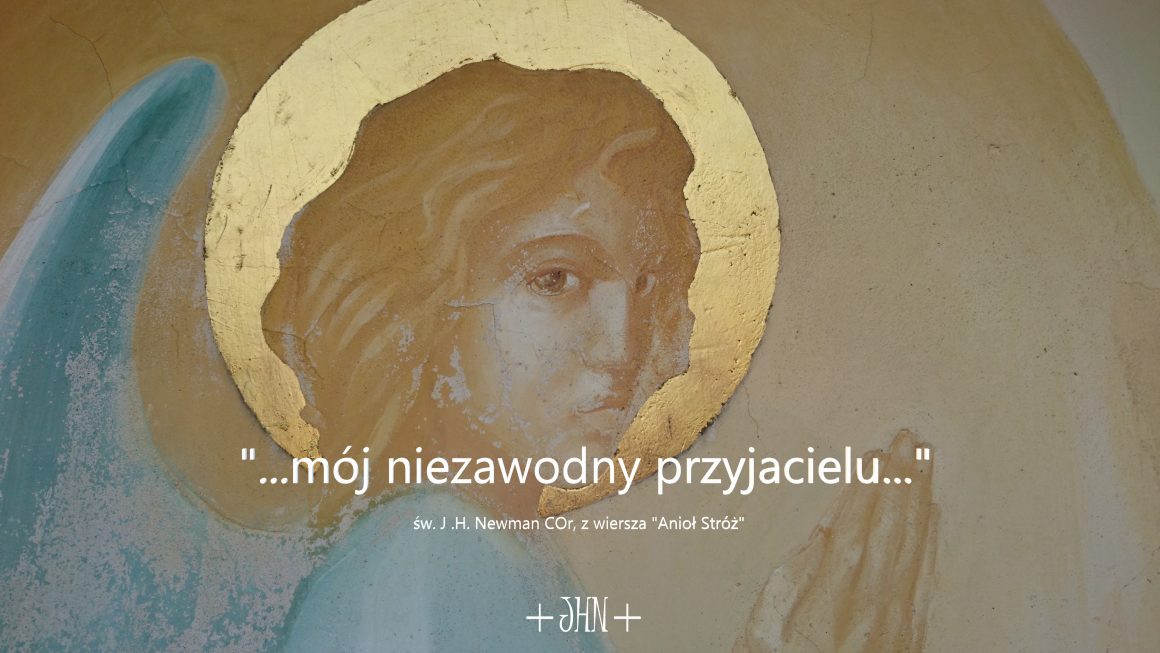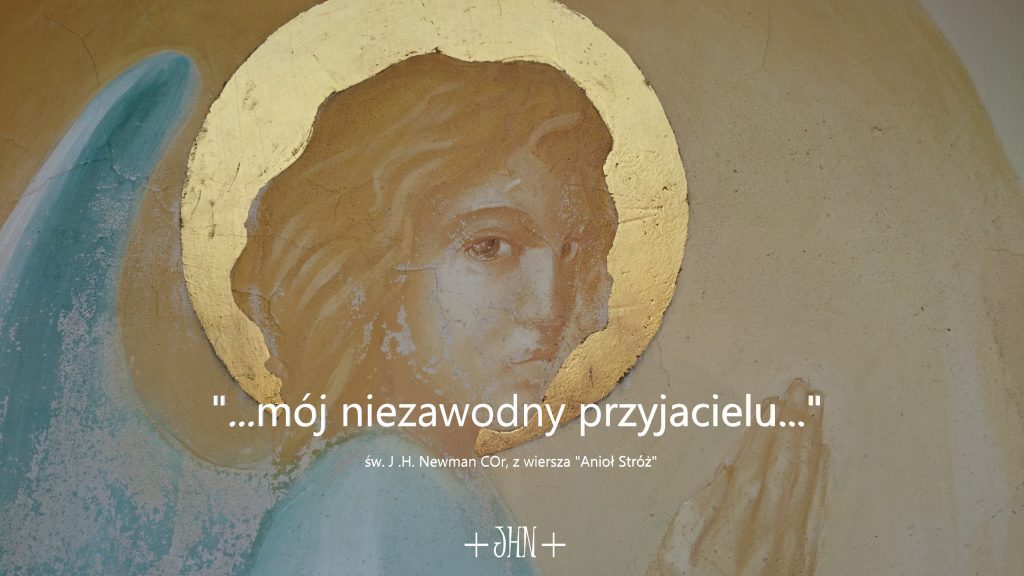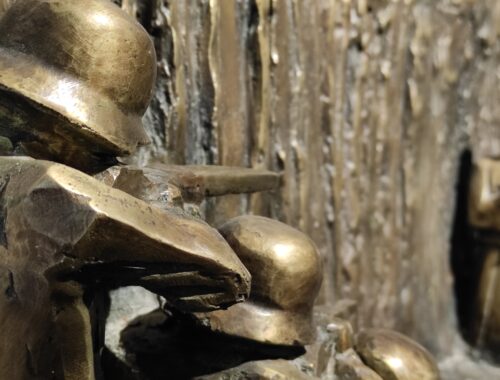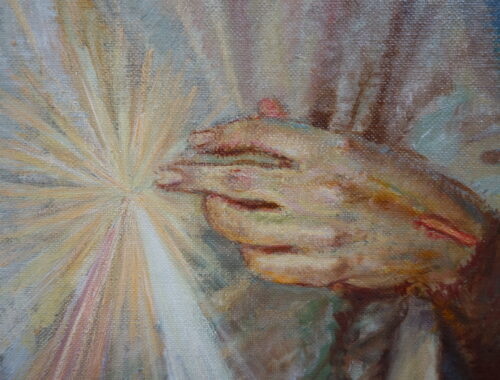
Newman – święty dla nas, inspiracja 26

Anioł Stróż. Trzy minuty z Newmanem
Barbara H. Wyman, M.A., M.F.A.
October 2 is the Memorial of the Holy Guardian Angels, and so the beautiful poem, “Guardian Angel,” by Blessed John Henry Newman, is appropriate for this week in which we have commemorated our faithful friends. In addition, in this week we recall the foundation of Opus Dei on Oct 2,1928 – on the feast of the Guardian Angels. St Josemaria’s devotion to these angels, whom he saw as celestial protectors and messengers, went back to his childhood. Many saints, like St. Josemaría and Blessed Newman, have had special devotion to these dear companions, assigned to us at birth.
In this moving poem, Blessed Newman tells us of his love for his angel, but he also gives sound Catholic teaching on guardian angels. “Guardian Angel” is one of Newman’s hymn poems, written after he had established the Oratory of St. Philip Neri in England. Newman’s earlier poetry, before he converted to Catholicism, was written during the Oxford Movement, and is often complex and can be difficult to understand. The early poetry was written for a different purpose than his later poetry; these later poems he wrote expressly to be sung as hymns, with the intent that they be easy to understand, especially by children. These hymn poems are straightforward and charming in their lyrical language. “Guardian Angel” is another fine example of Newman’s hymn poems; the verses need little explanation. This poem can be sung to several hymn tunes, since it is in Common Meter.
Blessed Newman calls his angel his oldest friend, who guided and helped him during every moment of his childhood, a friend who knows him completely. He thanks his angel for whispering in his ear, giving him guidance, calling him back when he had strayed. And then Newman reminds us that our guardian angels will remain with us, throughout life, and on our deathbed they will be there for us as well, lending us courage and strength in our last moments.
Newman would develop this theme more fully in “The Dream of Gerontius” written in 1865,13 years after writing the poem to his guardian angel. “The Dream of Gerontius,” his most famous poem, is a poem about the soul at the moment of death and ensuing judgment. The role of angels, particularly of the guardian angel, is one of the delightful aspects of “Gerontius.” The guardian angel accompanies Gerontius into Purgatory, but already in his earlier poem Newman teaches as well that the angel will remain by his side as his sin is “burned away” in the “golden furnace,” that is, Purgatory.
The poem “Guardian Angel” ends with a beautiful image, that of the guardian angel, whom Newman calls “brother of my soul” carrying him in his arms, the angel’s wings wafting him home, to heaven.
Do you remember your guardian angel as the “brother of your soul”? Do you ask him for assistance? Guardian Angels, pray for us! Help guide us Home!
Dzień 2 października to wspomnienie Świętych Aniołów Stróżów, a więc piękny wiersz „Anioł Stróż” św. Johna Henry’ego Newmana jest odpowiedni na ten tydzień, w którym wspominamy naszych wiernych przyjaciół. Ponadto w tym tygodniu wspominamy założenie Opus Dei, które miało miejsce 2 października 1928 r. – w Święto Aniołów Stróżów. Nabożeństwo św. Josemarii do Aniołów, których uważał za niebiańskich opiekunów i posłańców, sięga czasów jego dzieciństwa. Wielu świętych, jak św. Josemaría i św. kardynał Newman, darzyło szczególną czcią tych drogich towarzyszy, wyznaczonych nam przy narodzinach.
W tym wzruszającym wierszu św. John Henry Newman mówi nam o swojej miłości do swojego anioła, ale daje również solidną katolicką naukę o aniołach stróżach. „Anioł Stróż” to jeden z hymnów Newmana, napisany po założeniu przez niego Oratorium św. Filipa Neri w Anglii. Wcześniejsza poezja Newmana, zanim nawrócił się na katolicyzm, powstała podczas Ruchu Oksfordzkiego i często jest zawiła i może być trudna do zrozumienia. Ówczesna poezja została napisana w innym celu niż jego późniejsze dzieła. Mianowicie napisał je przede wszystkim po to, aby były śpiewane jako hymny oraz aby były łatwe do zrozumienia, zwłaszcza przez dzieci. Te wierszowane hymny są proste i urocze w swoim lirycznym języku. „Anioł Stróż” to kolejny wspaniały przykład hymnów Newmana; wersety wymagają niewielkiego wyjaśnienia. Ten wiersz można zaśpiewać do kilku hymnów, ponieważ zawiera charakterystyczny układ metrum.
„Anioł Stróż”
Najstarszy Druhu mój, od pory
Mojego narodzenia,
Mój niezawodny przyjacielu
Do ostatniego tchnienia.
Zawsze u mego stoisz boku:
Mój Stwórca twej opiece
Powierzył duszę mą, gdy z gliny
Lepił to małe dziecię.
Stuk mego serca w rozmodleniu
I polot wiary zdrowy
Nie oddał mię Józefa trosce
Ni mocy Michałowej.
Ni Patron, ani nawet miłość
Maryi przenajświętsza
Nie znają mię tak, jak tyś poznał
Szukając mego szczęścia.
Tyś mój opiekun u chrzcielnicy;
Potem, gdy lata biegną,
Szeptałeś elementy prawdy
Do ucha dziecięcego.
A gdy, w chłopięcym jeszcze wieku,
Duch stał się buntu winny,
Drżałeś ze zgrozy, lecz cię mroczne
Nie odepchnęły czyny.
Gdy zaś mię dopadł sąd i wreszcie
Zegnał z manowców moich.
Twe tchnienie było blisko, aby
Uświęcać ból i koić.
O, któż opowie całe dzieje
Zabiegów twych, starania,
Bym u stóp Piotra był, w uśmiechu
Maryi zmiłowania!
Gdy życie zacznie gasnąć, będziesz
Nad łożem mym przytomny,
Zwątpień, niepewności, mroku
Bezsenny wróg, niezłomny.
Mój będziesz, gdy przed Sędzią stanę,
Mój, jeśli mi pisane
Być w złotym piecu, aż mi ogień
Wypali grzechu ranę.
I mój, o Bracie duszy mojej,
W owej niewoli kresie:
Czule mię ujmiesz, moc twych skrzydeł
Do domu mię poniesie.
Oratorium, 1853
Św. John Henry Newman nazywa swojego anioła swoim najstarszym przyjacielem, który prowadził go i pomagał mu w każdej chwili jego dzieciństwa, przyjacielem, który zna go całkowicie. Dziękuje swojemu aniołowi za szeptanie mu do ucha, udzielanie wskazówek i wzywanie go z powrotem, gdy zbłądził. A potem Newman przypomina nam, że nasi aniołowie stróżowie pozostaną z nami przez całe życie, a na łożu śmierci też będą przy nas, dodając nam odwagi i siły w naszych ostatnich chwilach.
Newman rozwinął ten temat pełniej w wierszu pt. „Sen Gerontiusa” napisanym w 1865 roku, 13 lat po napisaniu wiersza do swojego anioła stróża. „Sen Gerontiusa”, jego najsłynniejszy poemat, to poemat o duszy w chwili śmierci i następującego po niej sądu. Rola aniołów, zwłaszcza anioła stróża, jest jednym z zachwycających aspektów „Gerontiusa”. Anioł stróż towarzyszy Gerontiusowi w czyśćcu, ale już we wcześniejszym wierszu Newman naucza, że anioł pozostanie przy nim, gdy jego grzech zostanie „spalony” w „złotym piecu” czyli czyśćcu.
Wiersz „Anioł Stróż” kończy się pięknym obrazem, przedstawiającym anioła stróża, którego Newman nazywa „bratem mojej duszy”, niosącego go na rękach, a skrzydła anioła niosą go do domu, do nieba.
Czy pamiętasz o swoim aniele stróżu jako „bracie swojej duszy”? Czy prosisz go o pomoc? Aniołowie Stróżowie, módlcie się za nami! Pomóżcie nam i prowadźcie do domu!
za: www.spreaker.com
tłumaczenie: s. Anna Musiał RSCJ
tłumaczenie wiersza „Anioł Stróż”:
Zygmunt Kubiak, z: J. H. Newman, Rozmyślania i modlitwy. Poezje, Warszawa 1995, s. 411-413.



